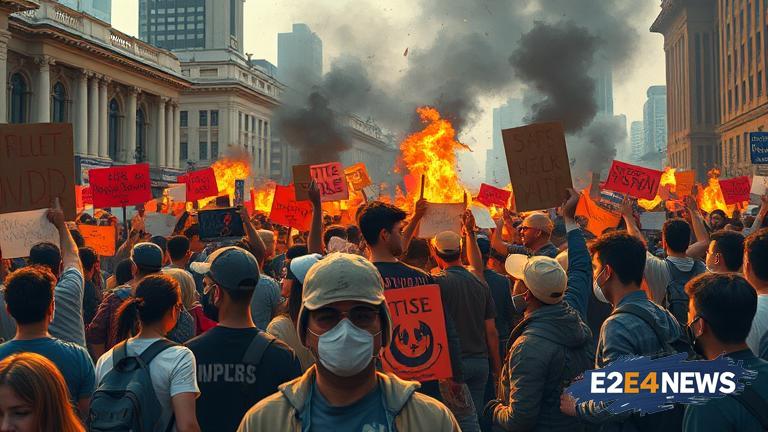The world is witnessing a surge in mass protests as people from all walks of life take to the streets to express their outrage and frustration over the deteriorating economic conditions. The global economic downturn has led to a significant decline in living standards, with rising inequality, poverty, and unemployment affecting millions of people. The protests, which have erupted in numerous countries, are a clear indication of the growing discontent among the population. The economic crisis, which has been exacerbated by the COVID-19 pandemic, has exposed the deep-seated flaws in the global economic system. The widening gap between the rich and the poor has become a major concern, with the wealthy elite accumulating more wealth while the majority of the population struggles to make ends meet. The situation has been further complicated by the rising cost of living, with prices of essential commodities skyrocketing, making it difficult for people to afford basic necessities. The governments, which have been slow to respond to the crisis, are now facing mounting pressure to take decisive action to address the economic woes. However, their efforts have been hindered by the lack of a clear strategy, and the situation continues to deteriorate. The protests, which have been largely peaceful, have been met with brutal force by the authorities in some cases, leading to injuries and arrests. The international community has been criticized for its inaction, with many calling for a coordinated effort to address the global economic crisis. The United Nations has issued a statement expressing concern over the situation, but concrete actions have been lacking. The economic downturn has also had a devastating impact on the environment, with the pursuit of economic growth taking precedence over sustainability. The consequences of inaction will be catastrophic, with the potential for social unrest, political instability, and economic collapse. The need for a radical transformation of the global economic system has never been more pressing. The current system, which prioritizes profits over people, has failed to deliver on its promises of prosperity and equality. A new economic model, which puts the needs of the people and the planet at its core, is urgently needed. The protests are a wake-up call for governments and international organizations to take immediate action to address the economic crisis. The time for rhetoric is over, and the time for action has begun. The world is watching, and the consequences of inaction will be severe. The economic crisis is a global problem, requiring a global solution. The international community must come together to develop a comprehensive plan to address the crisis. The plan must prioritize the needs of the most vulnerable, including the poor, the unemployed, and the marginalized. The economic system must be transformed to ensure that it serves the needs of all people, not just the wealthy elite. The protests will continue until the demands of the people are met, and the economic system is transformed to prioritize the needs of the people and the planet.
